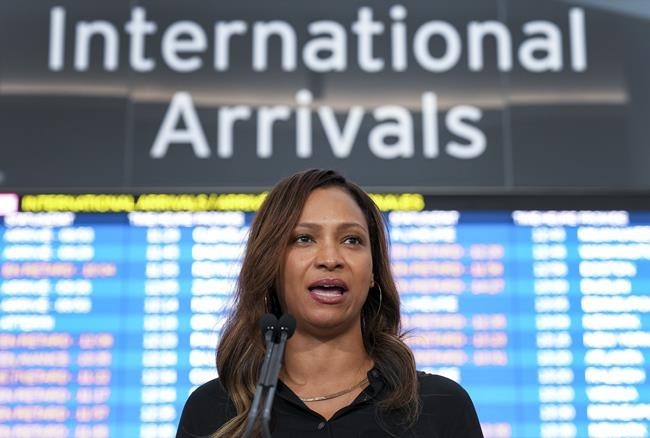MISSISSAUGA, Ont. — The head of Pearson International Airport said Friday that the number of delays at Canada's busiest travel hub are coming down, but stopped short of making specific commitments or timelines to improved travel times going forward.
"The plan that we've been working in concerted effort, the intensity of that, with our partners, is yielding results," said Greater Toronto Airports Authority chief executive Deborah Flint at a news conference from the airport.
Pearson saw 44 per cent of flights come and go on time last week, up from an average of 35 per cent over the four previous weeks, and far better than the 20 to 25 per cent it was seeing in the early parts of the summer, she said.
"This is not a number that I would normally tout at all, but given where we have been for the last four weeks and even before that, improving from 35 per cent is substantial."
For domestic travel, the average wait time for bags to arrive at the carousel is now 24 minutes, a three-minute improvement over the previous four-week average, Flint said.
As well, she says there were fewer instances where passengers were asked to remain on planes arriving at the gate to make room in the customs hall – 19 last week, down from the rolling average of 60 in the previous four weeks, and what was in the hundreds at the peak of the travel chaos.
The improvements come as the numerous agencies and companies operating in the hub work to fix bottlenecks in the system that have made the airport at times the worst ranked globally on delays.
Transport Canada reported late Friday that 86 per cent of passengers at Pearson were screened within 15 minutes by the Canadian Air Transport Security Authority in the first three days of August, the same average percentage as passengers at airports across the country.
The federal agency said in the release that the government continues to take action along with its air industry partners to improve travel, including through meeting with stakeholders, increased staffing, and improving the ArriveCAN app.
While operations are improving, Flint declined to provide any future performance targets for the airport. Asked repeatedly at the news conference for specific commitments to which the airport could then be held accountable, she said they are "committed to creating the airport of the future."
The airport has worked with government agencies and others to bring in some technological fixes as part of its efforts to improve traveller flow, including the integration of customs forms into the ArriveCAN app and the installation of eGates in customs halls. In the near future travellers will also be able to reserve times ahead for security screenings.
The airport authority however has not done enough to limit the number of flights to be closer to what Pearson could handle, which airports in cities like London and Frankfurt have done, said John Gradek, head of McGill University's aviation management program.
“GTAA abdicated its responsibilities to basically put a ceiling on the operations ... GTAA never said, wait a second, you can't do this because we're not ready. We don't have the infrastructure. We don't have the people.”
Flint said that the airport did implement some capacity restrictions back in early winter, while it worked with airlines to voluntarily reduce schedules in the spring.
The limits weren't enough to prevent the extensive delays though, which led Air Canada at the end of June to slash more than 15 per cent of its scheduled flights for July and August, affecting hundreds of thousands of customers.
Air Canada's actions show how much power, and responsibility, the airlines have in creating and fixing the problem, said Gradek, since the airport has only limited control on issues like flight delays and baggage wait times.
"The airlines are basically the ones that have that kind of responsibility. And the silence is defining."
Rather than lay blame however, Flint emphasized that the airport is working with its numerous partners, and that further progress can be expected.
"We are indeed far from the finish line, but the actions of the GTAA, the federal government, the agencies, the airlines and many other partners working concertedly together are indeed having a positive impact."
This report by The Canadian Press was first published Aug. 5, 2022
The Canadian Press



